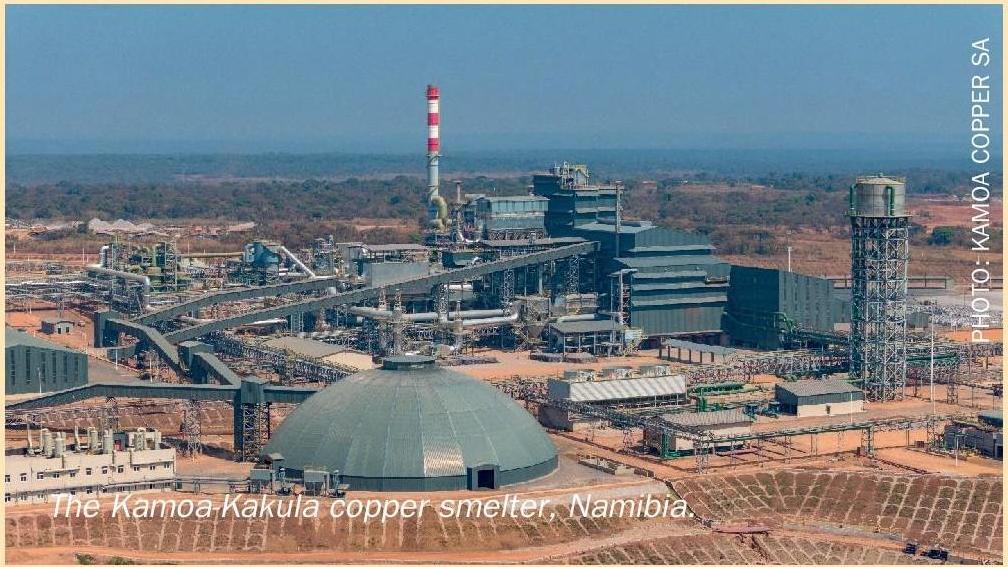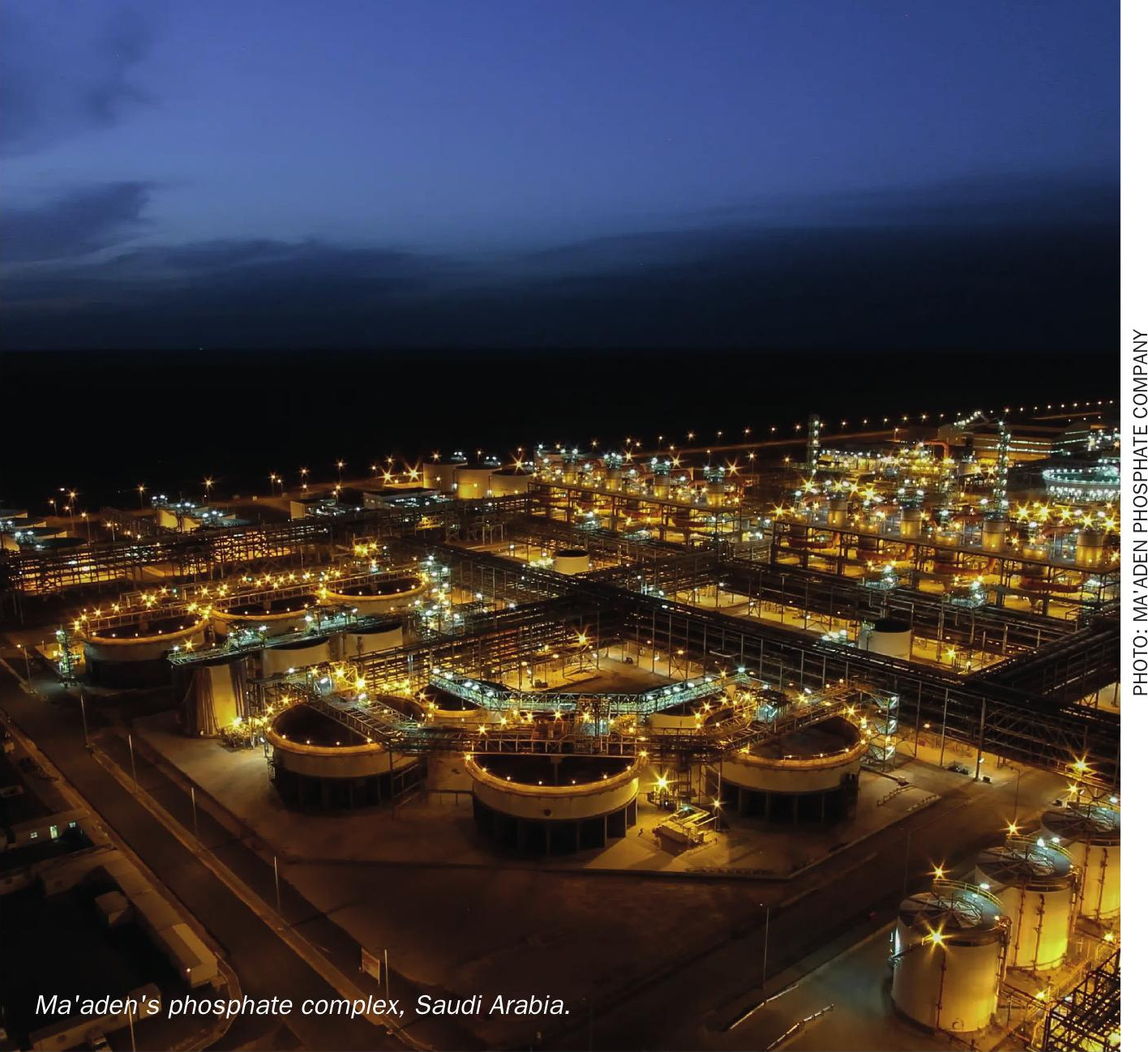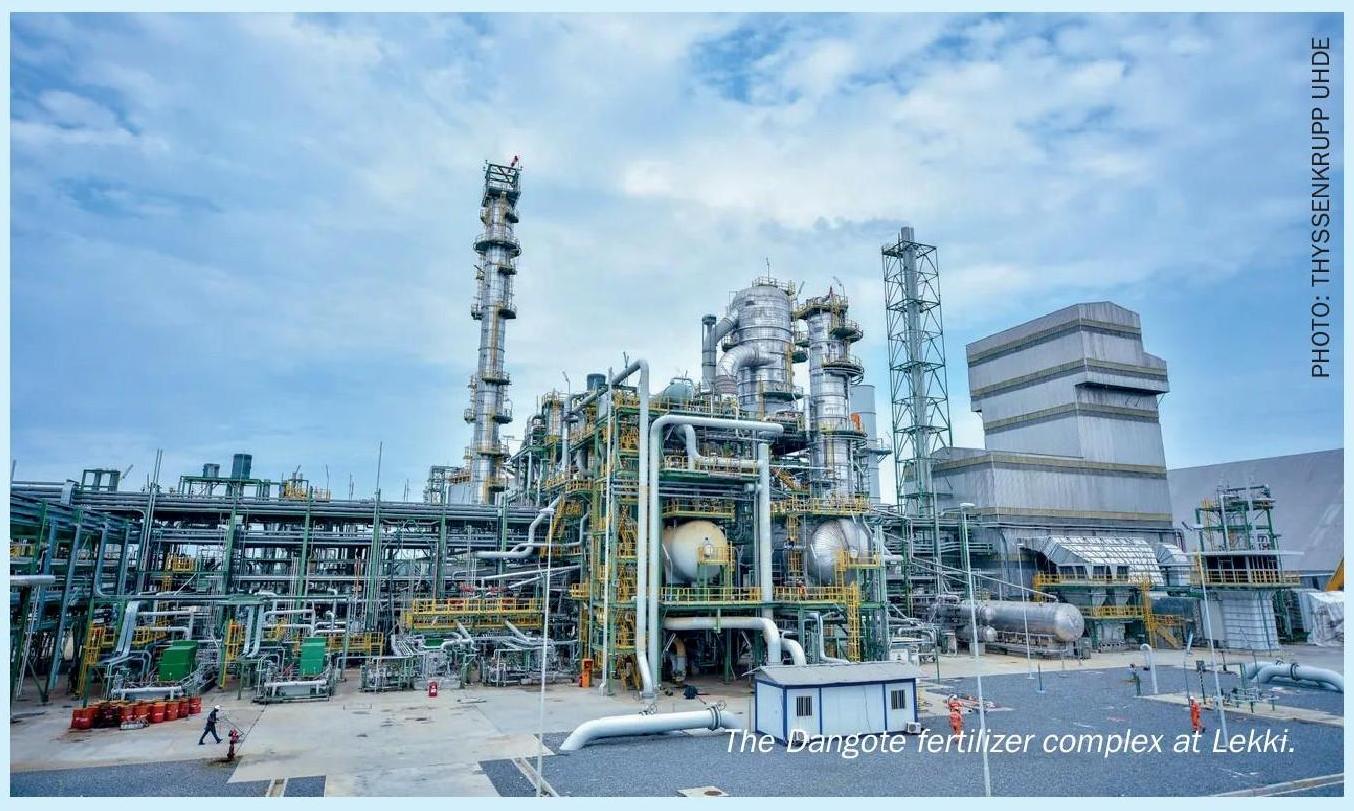Fertilizer International 519 Mar-Apr 2024

31 March 2024
Fertilizer Industry News Roundup
Fertilizer Industry News
INDIA
Paradeep Phosphates and Mangalore Chemicals announce merger

Paradeep Phosphates Limited (PPL) and Mangalore Chemicals & Fertilizers Limited (MCFL) have agreed to merge.
If approved, the consolidated company will become one of India’s largest integrated private fertilizer producers with a production capacity of around 3.6 million t/a.
The announcement on 7th February followed board-level approval by the directors of both companies. Under the agreed proposals, MCFL shareholders will get 187 shares in PPL for every 100 of their shares. These new PPL shares will be listed on India’s National Stock Exchange (NSE) and the Bombay Stock Exchange (BSE).
PPL is a major domestic phosphate producer. Its assets include the flagship Paradeep plant in Odisha and the newly acquired Zuarinagar plant in Goa – these having an NPK/DAP production capacity of 1.8 million t/a and 0.8 million t/a, respectively.
MCFL is a smaller scale fertilizer producer based in Karnakata in the south of India. It operates a 380,000 t/a capacity urea plant and a 260,000 t/a capacity diammonium phosphate (DAP) plant. the DAP plant can also produce NP+S (20-200+13S) and NP (16-20-00) grades, while the urea plant was revamped in 2002 and uses Stamicarbon technology.
“MCFL has a presence in the southern regions of India while PPL has a presence in the northern, central and eastern parts of India, making the proposed combined entity a pan-Indian fertiliser company,” the companies said in a joint statement.
“This move aims to enhance customer engagement, improve large deal capabilities, use manufacturing capabilities of both entities, reap benefits of economies of scale, optimise supply chain and thus create a more compelling value proposition for all stakeholders,” they added.
MCFL and PPL have formed an implementation committee to oversee the merger process and liaise with regulators, employees, vendors, customers and other stakeholders.
Suresh Krishnan, PPL’s managing director & CEO, said: “Consolidation of PPL and MCFL will mark a significant leap forward in our growth strategy and the resultant entity will be able to cater to the diverse soil needs of the country. We will be able to reap the benefits of economies of scale, optimize product mix, enhance distribution reach and supply chain capabilities and leverage on each other potent synergies. This will result in unlocking tremendous value and drive sustainable growth for our shareholders, employees, and partners.”
MCFL director Nitin Kantak said: “The proposed merger will enable us to become a larger player and will help us to serve our market in a more diversified manner and will result in enhanced value creation for all the stakeholders.”
The proposed merger will require the approval of shareholders, creditors and the Competition Commission of India.
$2.95 billion P&K subsidy for Kharif season
The Indian government has allocated subsidies worth INR 244 billion ($2.95 billion) to phosphate and potash fertilizers for the upcoming six-month Kharif season (1st April to 30th September).
The expenditure, which is set under the country’s nutrient-based subsidy (NBS) scheme, is down INR 135.8 billion from the 2023 Kharif season.
“The subsidy on P&K fertilizers will be provided based on approved rates for Kharif 2024 to ensure smooth availability of these fertilizers to the farmers at affordable prices,” the government said in a 29th February statement.
The NBS scheme will also include three new fertilizer grades, it added, without naming these.
Some NBS subsidy rates have risen while others have remained the same. The newly announced 2024 Kharif season subsidy for phosphate fertilizers is INR 28.72/kg, for example, up 38 percent from the 2023 Rabi season subsidy of INR 20.82/kg.
The 2024 Kharif season nitrogen, potash and sulphur subsidies, meanwhile, are unchanged from the 2023 Rabi season at INR 47.02/kg. INR 2.38/kg and INR 1.89/ kg, respectively.
The government-set maximum retail price (MRP) for DAP and potash, at INR 1,350 and INR 1,670 per 50 kg bag, respectively, is also unchanged for the Kharif season.
YEMEN
Houthi missile hits fertilizer cargo vessel
The crew of the Handysize bulk carrier Rubymar abandoned ship off the coast of Yemen after it was hit by a missile fired by Houthi militants on 18th February.
The Belize-registered but British-owned vessel was said to be carrying a cargo of Saudi fertilizer.
The Rubymar was approaching the Gulf of Aden near the Bab el-Mandeb strait when it was hit by at least one missile, according to US Central Command, while another missed the vessel. The crew were safely evacuated and taken to the port of Djibouti, after a coalition warship and a merchant ship answered a distress call from the damaged vessel.
The UK Maritime Trade Operations (UKMTO) also reported the attack. It said the vessel was at anchor 40 miles (about 64.4 km) south of Mokha, Yemen, and had been abandoned.
The fertilizer-laden Rubymar left the Saudi Arabian port of Ras al-Khair on 8th February and was destined for the Black Sea port of Varna, Bulgaria, where it was due to arrive on 27th February.
Vessel-tracking data confirm the 30,000-tonne capacity vessel was carrying an unspecified cargo of fertilizers. Bulgaria has imported NP grades from Saudi Arabia previously, according to reports.
CANADA
Mosaic curtails Colonsay production again

Mosaic is curtailing production at its Colonsay potash mine Saskatchewan “in response to current market conditions”, the company announced on 21st February.
Production only resumed at Colonsay in August last year after the previous December 2022 curtailment. The mine had been operating with an annual run rate of 1.3 million tonnes – with plans to expand this to 1.8-2.0 million tonnes later this year by restarting Colonsay’s second mill.
The curtailment was announced as part of Mosaic’s 2023 full year and fourth quarter results. The company’s potash earnings (adjusted EBITDA) totalled $1.5 billion in 2023, down from $3.1 billion in 2022.
PORTUGAL
Tecnimont secures green ammonia plant contract
MadoquaPower2X has awarded Maire Group subsidiary Tecnimont a front-end engineering design (FEED) contract for an integrated green hydrogen and green ammonia plant at Sines, Portugal.
MadoquaPower2x is a project development consortium formed by Madoqua Renewables, Power2X and Copenhagen Infrastructure Partners (CIP).
The proposed plant will generate green hydrogen using alkaline-water electrolyser technology and use this to produce green ammonia via the Haber-Bosch process. Green ammonia will then be transported by pipeline to the Port of Sines where it will be loaded for export and/or used as maritime fuel.
Tecnimont’s engineering design work covers the integration of the electrolysers, an air separation unit for nitrogen production, the ammonia production plant, as well as storage and ship loading. Tecnimont has also been asked to submit an engineering, procurement and construction (EPC) proposal to build the integrated green hydrogen and green ammonia plant.
The award of the FEED contract follows a pre-FEED study carried out by NextChem Tech, another Maire Group subsidiary.
MadoquaPower2X plans to capture renewable energy generated by under-development solar and wind assets in Portugal. This will be used to power as much as 500 MW of electrolysis capacity to produce up to 1,200 t/d of green ammonia. It will be the first project in Sines, the largest industrial and logistics hub in the Iberian peninsula, to produce ammonia from clean energy at industrial scale. The venture is part of a wider plan to set-up a value chain for green ammonia between the Port of Sines and a proposed Northwestern European Hub.
SWEDEN
g2bn green fertilizer plant announced
Fertiberia, Lantmännen, and Nordion Energi have joined forces to develop Sweden’s first fossil-free fertiliser production plant.
The three partners have formed the joint venture Power2Earth to deliver the e2 billion project – said to be the largest of its kind in the Nordic region – with production scheduled to start in 2028. The project will be located in Luleå, Sweden, and produce one million tonnes of ‘green’ fertilizers per annum.
The partners have securing land for the production plant at Luleå and completed several feasibility studies since the project began in 2021. An environmental permit application for the project is due be submitted in the second quarter of this year.
The Luleå plant will be based on the generation of green hydrogen via water electrolysis and renewable energy. It builds on technology previously developed by Fertiberia in Spain.
Green fertilizer production at the plant has the potential to reduce carbon dioxide emissions by around 1.6 million tonnes, according to Power2Earth, this corresponding to roughly 25 percent of Sweden’s agricultural emissions.
Javier Goñi, CEO of Fertiberia, said: “Fertiberia brings its industrial experience of more than five decades in the production, operation and logistics of ammonia, as well as its leadership in driving green hydrogen to decarbonise the agriculture sector with state-of-the-art fertilisers. We are also proud to contribute to the achievement of Sweden’s ambitious CO2 emission reduction targets while providing regional growth and building a more resilient food supply with reduced dependence on imports.”
Lantmännen is an agriculture cooperative owned by 18,000 Swedish farmers and is a leading player in Northern European agriculture, machinery, bioenergy and food products.
Per Arfvidsson, Lantmännen’s deputy CEO and CTO, said: “Power2Earth is revolutionary for the Swedish agricultural and food industry as fossil-free mineral fertiliser is crucial for creating a sustainable, efficient and future-proof food chain. Domestic production of mineral fertiliser reduces Sweden’s overall dependence on fertiliser imports and is essential for developing a robust food preparedness.
Nordion Energi specialises in energy infrastructure and is the transmission systems operator (TSO) for the Swedish gas network.
Hans Kreisel, CEO of Nordion Energi, said: “Power2Earth is the first step on the Nordic Hydrogen Route, a 1000-kilometer-long underground hydrogen pipeline connecting Sweden and Finland. We are proud to contribute to regional green transition, economic development, and Swedish self-sufficiency together with Fertiberia and Lantmännen.”
OMAN
Yara secures green ammonia supply deal
Yara has secured a long-term supply agreement for green ammonia produced in Oman.
The Norwegian-headquartered fertilizer giant signed a binding offtake agreement with Acme Cleantech subsidiary GHC SAOC on 1st March. This covers the supply of 100 000 t/a of green ammonia.
The ammonia will be supplied by Acme from the first phase of its green hydrogen and ammonia project in Duqm, Oman. The project, which successfully raised $488 million in funding last July, is expected to start-up production in 2027. Acme plans to develop the project in phases to reach an ultimate green ammonia capacity of 900,000 t/a.
Favourable conditions for renewable energy generation, a strategic location, plus the government’s proactive approach, combine to make Oman attractive as a green ammonia hub, according to Yara. The low-carbon ammonia supplied by Acme will comply with EU regulations such as the Renewable Energy Directive and renewable fuels of non-biological origin (RFBNO) requirements, it said.
Acme is one of India’s largest independent renewable power producers with a project portfolio of more than 8.5 GWp of renewable capacity. These projects are either in operation or at the implementation stage. The company also built one of the world’s first green ammonia plants at Bikaner, Rajasthan, in 2021.
CHINA
Stamicarbon wins another ultra low energy plant contract
Stamicarbon has secured licensing and equipment supply contracts from Jiangsu Huachang Chemical Company for a urea melt plant in Zhangjiagang, Jiangsu province, China.
The 1,860 t/d capacity urea plant will use Stamicarbon’s Ultra-Low Energy design and incorporate a highly efficient pool reactor. It will replace an outdated melt plant of similar capacity that is currently operating but keep the existing prilling unit.
Stamicarbon’s contract covers technology licensing and the supply of proprietary equipment, including high-pressure items made of super duplex stainless steel, and associated professional services.
Stamicarbon’s Ultra-Low Energy design improves heat recovery, compared to the conventional CO2 stripping process, by using high-pressure steam three times instead of the normal two. This reduces steam consumption by 35 percent and cuts cooling water use by 16 percent. This energy efficient design is currently in operation at two urea plants.
EGYPT
Stamicarbon to supply urea melt and granulation plant
El-Nasr Company for Intermediate Chemicals (NCIC) has awarded NextChem, via its nitrogen technology licensor Stamicarbon, a licensing and equipment supply contract for a urea melt and granulation plant.
The state-of-the-art 1,050 t/d capacity plant will be located 100 kilometres southeast of Cairo. NCIC selected Stamicarbon technology based on process optimisation, operational safety, enhanced yields, low energy consumption and superior product quality.
NextChem and Stamicarbon are both part of Maire Group.
thyssenkrupp Uhde to recommission Delta ammonia plant
thyssenkrupp Uhde, via its Egyptian subsidiary, has signed a frontend-engineering design (FEED) contract with the Delta Company for Fertilizer and Chemical Industries (Delta Fertilizers) to revamp and restart an ammonia plant at Dakahlia, Talkha, Egypt.
thyssenkrupp Uhde will recommission the ammonia plant after a three-year shutdown, while at the same time increasing its capacity from 1,275 t/d ammonia to 1,400 t/d. Additionally, its contract covers the restoration of offsite and central utility units. The German engineering company will also supply Delta Fertilizers with state-ofthe-art technology for the production of ammonia and urea at the Dakahlia complex.





